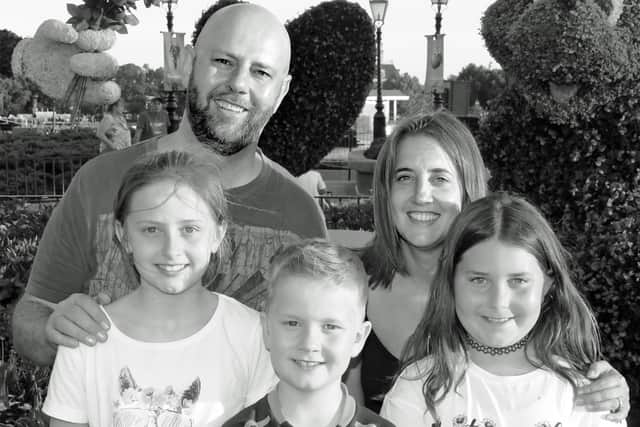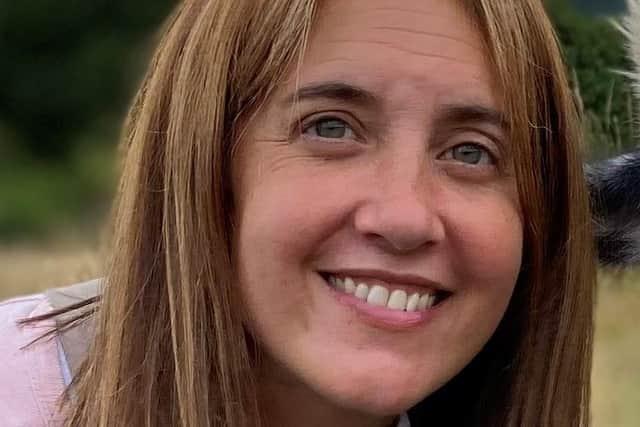Widow of Scottish Government official accuses troubled hospital of deliberate cover-up around husband's death
Andrew Slorance, who was head of the Scottish Government’s response and communication unit, went into hospital to be treated for cancer in October 2020.
He later tested positive for Covid-19 and another life-threatening infection, both of which his widow, Louise Slorance, believes he contracted while at QEUH.
Advertisement
Hide AdAdvertisement
Hide AdMrs Slorance only discovered the fact her husband had been infected with the common fungus, aspergillus, which can be dangerous if it infects those with a weaker immune system, when she requested a copy of his medical records.


She accused officials of wanting to protect the hospital and its reputation “no matter what the cost”.
The QEUH is currently subject to an ongoing public inquiry into its construction after years of controversies around the quality of the building potentially leading to the deaths of children and other patients.
The health board said it had been open and there was “no attempt to conceal any information”.
Andrew, a father of five and lived in Edinburgh, worked as a civil servant on the Scottish Government’s emergency response communications, and previously worked as the First Minister’s chief spokesperson under Alex Salmond.


He was also a cancer patient, having been diagnosed with Mantle Cell Lymphoma in 2015, suffering a relapse in 2019.
His admission to QEUH was to receive stem cell treatment in October.
Andrew later tested positive for Covid in early November before passing away on December 5, last year, aged 49.
Advertisement
Hide AdAdvertisement
Hide AdLouise said she blamed the hospital for Andrew’s onset of Covid, after he had spent months living and working in a 10ft by 10ft room with no close contact from anyone.


She also criticised the hospital for “never” mentioning the onset of the aspergillus infection, alleging to the Daily Record: “NHS Greater Glasgow and Clyde deliberately concealed this information”.
She added: "I think somebody and probably a number of people have made an active decision not to inform his family of that infection, either during his admission or post-death."
"The impact of the health board hiding the fungal infection will have lifelong impacts on all members of our family, including five children.
"The reason? To protect a building, a health board and political decision-making."
Asked whether she believed Andrew would still be alive had he not been admitted to the Glasgow hospital, she said: “Yes, his cancer was in remission”.
Louise has called for an independent case note review into aspergillus at the QEUH and for a “thorough” investigation into hospital-acquired Covid by the Crown Office.
Responding, NHS Greater Glasgow and Clyde said: "We are sorry that the family are unhappy with aspects of Mr Slorance's treatment, details of which were discussed with the family at the time.
Advertisement
Hide AdAdvertisement
Hide Ad"While we cannot comment on individual patients, we do not recognise the claims being made.
"We are confident that the appropriate care was provided. There has been a clinical review of this case and we would like to reassure the family that we have been open and honest and there has been no attempt to conceal any information from them."
A Scottish Government spokesperson said: "Our thoughts and condolences are with Andrew’s wife and family. Andrew was a greatly valued member of the Scottish Government team who is deeply missed by everyone who had the privilege of meeting him. He made an exceptional contribution to our work.
"While we can’t comment on individual cases, we will be engaging with the health board so that concerns raised are properly investigated.
“We are testing more patients in hospital which enables us to identify more asymptomatic positive cases.
“This ensures that we can provide the right care and treatment for patients whilst utilising enhanced infection prevention and control measures to reduce the opportunity for further transmission.”
A message from the Editor:
Thank you for reading this article. We're more reliant on your support than ever as the shift in consumer habits brought about by coronavirus impacts our advertisers.
If you haven't already, please consider supporting our trusted, fact-checked journalism by taking out a digital subscription.
Comments
Want to join the conversation? Please or to comment on this article.
